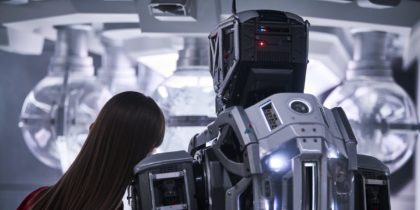In order to explore the ideas of Jurassic Park Rebirth, this post contains spoilers for the film. Jurassic World Rebirth, the latest film to spin out of Michael Crichton's novel Jurassic Park, opens with a flashback revealing experiments to create mutant species of dinosaurs which never existed. We are clearly meant to be unsettled, if not outright horrified, by this revelation even before it is underlined by the death of a scientist or technician at the claws of one such creature. (In what I hope is a nod to the … [Read more...] about Science Corner: Recombination is Creativity
artificial intelligence
Science Corner: Should AI Stand for Alien Intelligence?
Over the holiday weekend, I chatted with my sister-in-law about a study her and her dog participate in on providing communication tools to canines. Maybe you saw this segment on CBS Sunday Morning or some other reporting on this work. The dogs are given buttons, each of which plays a recording of a spoken word. We know dogs have some capacity to understand spoken language, since they can be trained to respond to commands. The word buttons close the loop, allowing the dogs to use words as well. While the sophistication … [Read more...] about Science Corner: Should AI Stand for Alien Intelligence?
Science Corner: Sing a New Song
Music has been helping us stay together even as we stay apart, from window serenades to video conference concerts. It is hard to imagine we will ever have a shortage of music making, not to mention the decades of existing music recordings. So we don't need to train computers to make new music for us, but of course that hasn't stopped us. We don't do it so that they can replace us, we do it so we can better understand the music we make and what makes it appealing. And whether it is the intention or not, I think teaching … [Read more...] about Science Corner: Sing a New Song
Sci-Fi Film Fest: Talking I Am Mother with Sam Blair
Welcome to the first Emerging Scholars Network Sci-Fi Film Festival! I'll be having a conversation here on the blog on various classic and current science fiction movies. Feel free to watch alonggh and join the conversation. This week's film is I Am Mother, a Netflix film from this year about a robot raising a human in a post-apocalyptic future (FYI: there will be spoilers). I'm joined by Sam Blair. Sam (@revsblair on Twitter) is a hospice chaplain in the Pittsburgh area and co-host of the Church of the Geek podcast. … [Read more...] about Sci-Fi Film Fest: Talking I Am Mother with Sam Blair
Science Corner: Predicting Periodically
The periodic table turned 150 earlier this year, or at least March 1 was the 150th anniversary of the publication of Dmitri Mendeleev's version. Chemists had organized the elements in a tabular fashion previously, and some features (like interactivity!) of contemporary representations would be added later. Still, Mendeleev's published version was a significant milestone, since he recognized regularities within properties of the elements which suggested some elements with specific features were undiscovered. Even better … [Read more...] about Science Corner: Predicting Periodically




